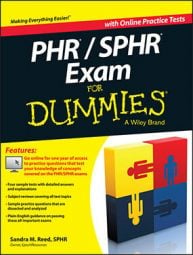In order to get the most out of taking practice exams for the PHR/SPHR, you need to use your time wisely. You want to practice with as many as you can before you take the actual exam. These tips can help you maximize your results.
When you're practicing with content review in mind, consider the following:
Take the practice tests open book. Practice exams can serve many masters, one of which is to teach you exam content. The assessments included in this book include a comprehensive answer review that explains both the correct and the incorrect answers. Taking the tests open book can align your studying efforts with the application to the test, the most effective way to master this material.
Look for the answers online and see what reading material or videos are related to that question. If you have time, studying the test questions this way creates a depth of knowledge that is transferable to the exam. The exams are designed to measure not only knowledge, but experience as well. Real-world examples of the concepts surface online, giving you an experience-based perspective for future recall. Take the concept of a balanced scorecard for example. When you type this phrase into your search engine, one of the top results will be the Balanced Scorecard Institute. Here you can find case studies related to companies who have used this measurement tool to great effect. Many of the exam objectives start with "design, develop, implement, and measure . . .." So, when reading your case study, highlight the activities related to the design, development, implementation, and measurements of this tool.
When going online to study, stay away from lawyer websites or generic databases. Search for sites that end in .org or .gov to ensure that you're applying the right material. Credible journal sites are also a good place for free to low cost information, providing insight into trends and current practices in the field of HR.
While taking a practice exam, check your answers as you go. Doing so can ensure that you're learning the information correctly and not storing incorrect information. Focus on the content of the questions and the right answers (and why they're correct). Then take another test, trust your gut, and wait until you're finished to check your answers.
When you're focusing on exam simulation when taking practice exams, keep these tips in mind:
Practice using similar tools to what will be available at the professional testing site. For example, use an online calculator for the math questions. Use noise-cancelling headphones or ear buds to gauge comfort level with the tools provided onsite. Most importantly, time yourself to approximately 1 minute per question to train your mind to the pace of the exam. These conditioning strategies will serve to minimize your anxiety and give you insights into your individual preferences.
The more practice exams you take, the more opportunities you have to simulate exam day conditions and determine your personal preferences, all while learning content. These are worthy investments that should not be under-estimated.
Mimic the conditions of test day as close as possible. Doing so is just an important exam preparation activity as is learning the content, because it minimizes the likelihood of unpleasant surprises on test day. Set aside three hours with no distractions (no crying kids, no needy pets, and no demanding co-workers). Your goal is to answer all 175 questions in three hours. For example, practice at the same time of day your exam is scheduled for. Be aware of other common distractions that happen during those conditions, such as hunger or fatigue. Know before exam day how you're going to handle these common distractors so that you don't inadvertently sabotage your success by being unprepared for the unexpected.
Measure to see if you can sit for three hours without using the restroom, which may seem somewhat silly, but you want to make sure that you're comfortable with the exact conditions that you'll face at the testing center. Plan ahead at home during a practice test rather than on game day. (If you can't sit that long without using the restroom, then you should avoid drinking anything several hours before taking the test, or account for a quick bathroom break in the amount of time that you'll have to answer each question.)

